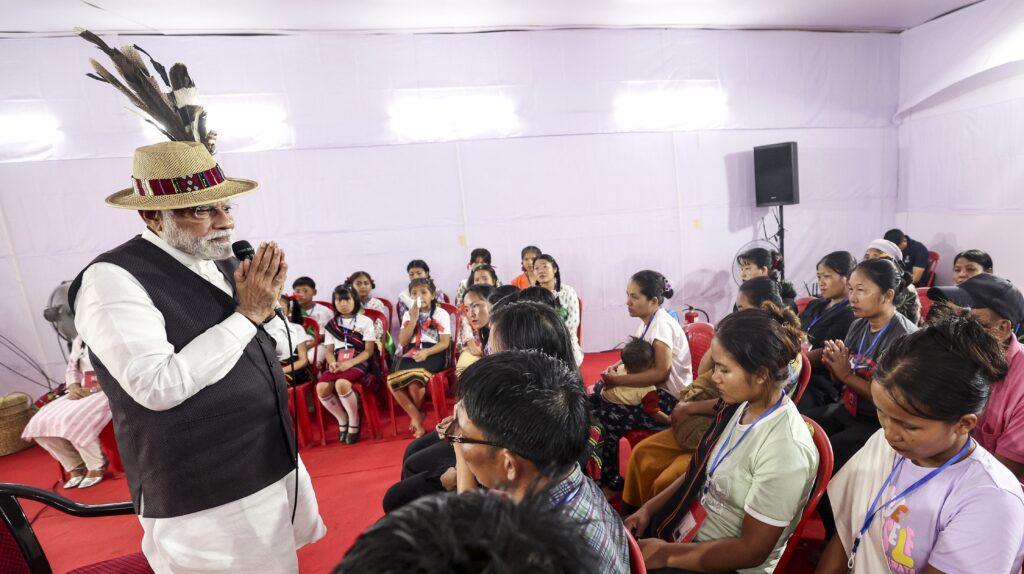New DelhiSeptember 13, 2025 05:38 PM IST
First published on: Sep 13, 2025 at 05:38 PM IST
On a day that Prime Minister Narendra Modi visited Manipur for the first time since ethnic violence broke out in the state in May 2023, the Kuki-Zo Council (KZC) submitted a memorandum to the PM during his visit to Churachandpur, demanding a “lasting political solution” in the form of a “separate administration”.
The KZC, a leading civil society organisation, argued that the hill-based Kuki-Zo people, devastated by prolonged ethnic violence, could no longer live under the “domination” of the valley-based polity and sought Union Territory (UT) status with a legislature under Article 239A of the Constitution for their region.
“For years, we have consistently demanded complete separation from Manipur, seeking a separate administration in the form of a Union Territory with a legislature… This demand arises not from convenience, but from necessity – for peace, security, and survival of our people,” the KZC’s memorandum said.
Pointing to the September 4 Suspension of Operations (SoO) agreement between the Central government and some Kuki militant groups for a “time-bound political settlement”, the KZC urged the government to expedite the dialogue process.
Referring to the toll of the ethnic strife, the KZC alleged, “More than 250 innocent lives have been lost at the hands of the majority Meitei community; over 360 churches and places of worship reduced to ashes; more than 7,000 homes burnt; and over 40,000 of our people remain displaced in relief camps, separated from their ancestral homes.”
The demand for a “separate administration” has long been a sore point in Manipur, with Meitei valley groups opposing any division of the state’s territory. But the hill-based Kuki-Zo tribal bodies have argued that existing autonomous district councils are dysfunctional and “toothless”, citing the lack of funds and powers as reasons why they remain disempowered under a “Meitei-dominated polity”.
It was against this backdrop that Modi, addressing tribal communities in Churachandpur earlier in the day, sought to reassure them of the Centre’s commitment to grassroots empowerment. “It is the government’s effort that local body governance is strengthened. Appropriate funds are being arranged for the development of local bodies. The development of every tribal community is a priority for the country,” he said.
The PM listed measures such as the Dharti Aaba Gram Utkarsh Abhiyan in more than 500 villages and 18 new Eklavya Model Residential Schools as examples of targeted tribal development. He also pointed to projects like new medical colleges in the hill districts and healthcare schemes under Ayushman Bharat to argue that tribal communities were no longer left behind in the development process.
In his speech, Modi also acknowledged the violence that continues to impact life in the state. “This land of Manipur is the land of hope and aspirations. But, unfortunately, violence took over this magnificent region,” he said, after meeting displaced families in relief camps. He announced measures, including the construction of 7,000 homes for the displaced and a Rs 3,000-crore special package, of which Rs 500 crore has been earmarked specifically for relief.
While the PM urged the communities to return to the path of peace and dialogue, the KZC claimed that faith in reconciliation within the existing state structure had been “exhausted”.
“The reality is that the Kuki-Zo people have been forcibly separated by the aggression of the majority community in Manipur. Yet, despite these grave circumstances, we continue to uphold our faith in the democratic spirit and leadership of India,” the KZC’s memorandum to the PM said. “We are confident that under your able leadership, our voice will be heard, our pain acknowledged, and our aspirations respected.”


